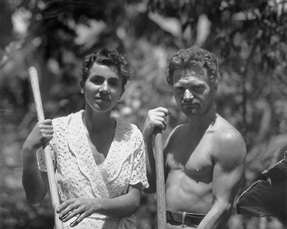
In this film, filmmakers Dayna Goldfine and Dan Geller (Ballet Russes) explore the lives of Galapagos settlers, including early settlers in the 1930s and 1940s, current settlers, and other related parties such as historians and descendants of the early settlers. The film inspects fragments of their lives through old journal entries and letters, as well as home videos recently recovered from the USC archives. The fragmentary nature is a bit frustrating, but also lends itself to worthwhile philosophical meanderings. In one instance, a character supposedly remarked, “Nietzsche says to live is to suffer, to survive is to find some meaning in suffering. We cannot expect to find paradise anywhere, unless we are willing to create it.” Reflecting on her struggle with multiple sclerosis, his mistress responds, “I pull myself together and struggle on.” This exchange introduces major themes of the film, including struggling to survive in nature, which is often more hardship than paradise, and eluding the binding nature of society and the struggle to live outside of those bounds. I wish more moments of philosophical reflection occurred in the film; it’s mostly just information walking through the existence and mundane experiences of different settlers. In total, The Galapagos Affair details seven characters from the past and fifteen from the present.
When current settler Jacqueline De Roy was asked about her search for paradise on the Galapagos, she retorted, “I don’t like to use that word paradise…we were looking for a place where we were our own masters, and [where life] depends on our own self.” It seems all the settlers, whether it be from the 1930s or the 2000s, were looking for isolation from society. Did I need two hours and 22 characters to explore this? I don’t think so. Even with the well-studied filmmakers and talented voice actors, this doesn’t elevate much above a museum documentary. Proceed with caution.
Grade: C+/B-
 RSS Feed
RSS Feed
